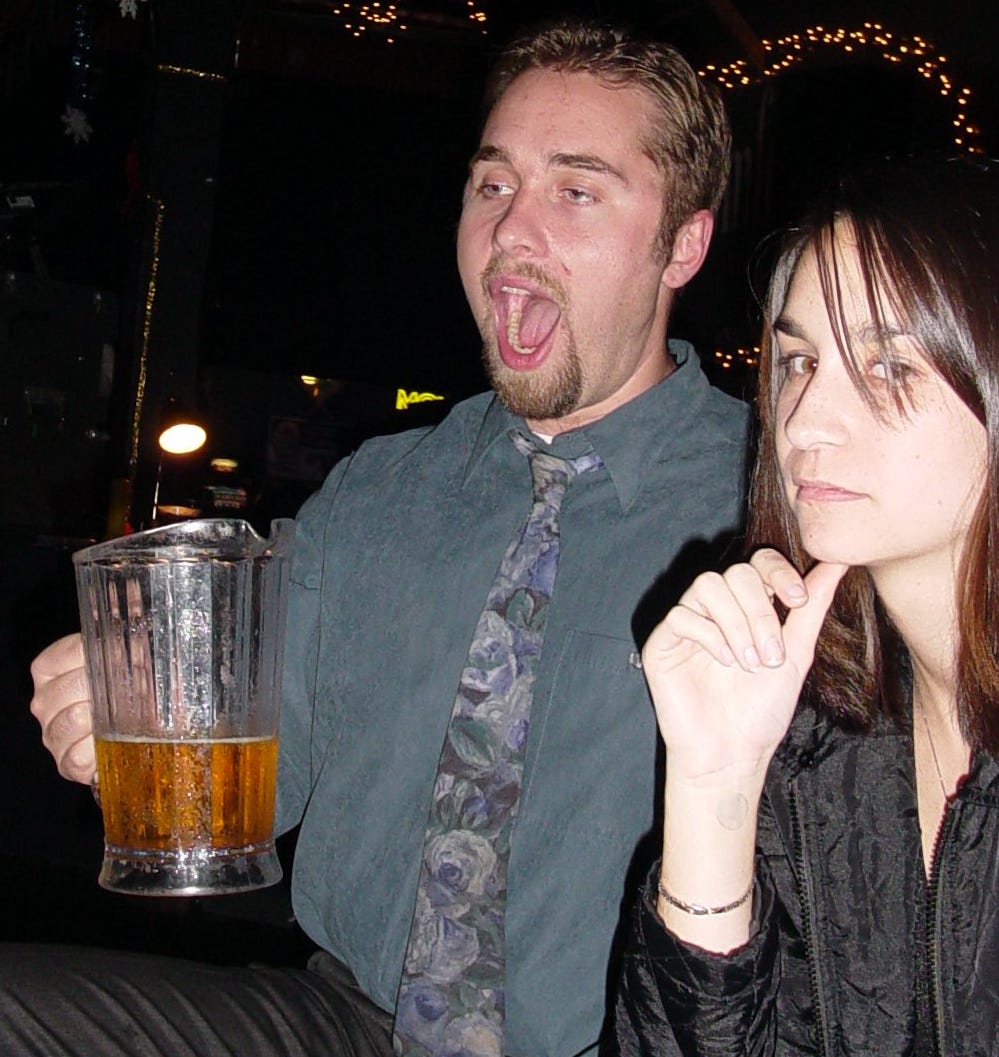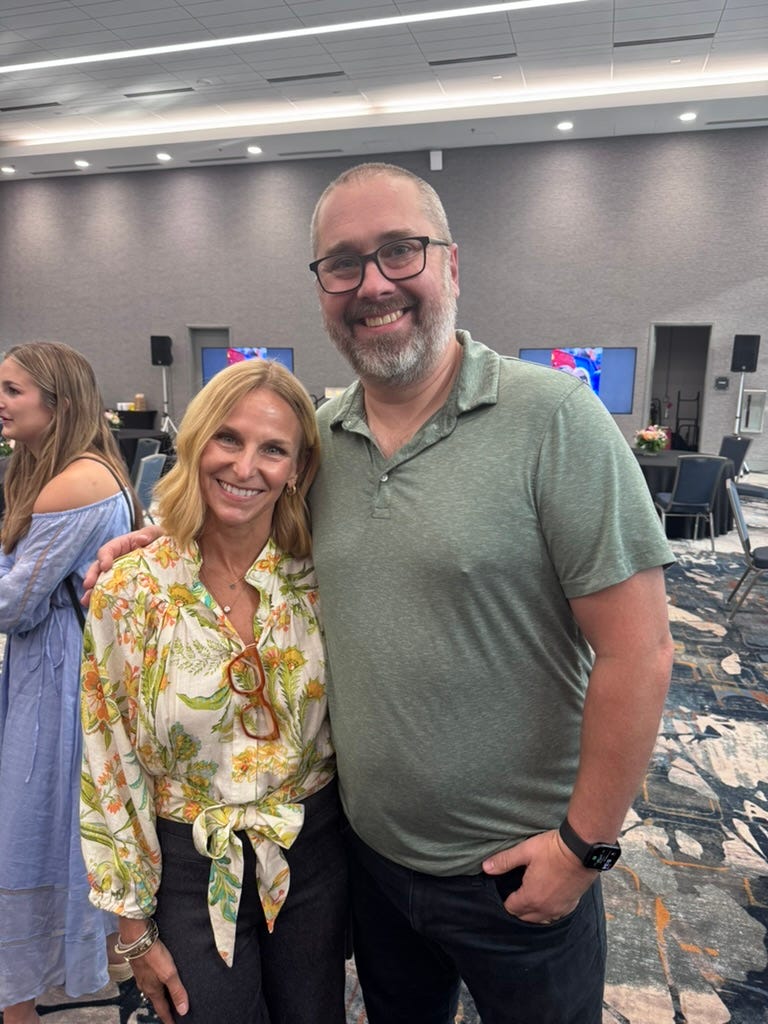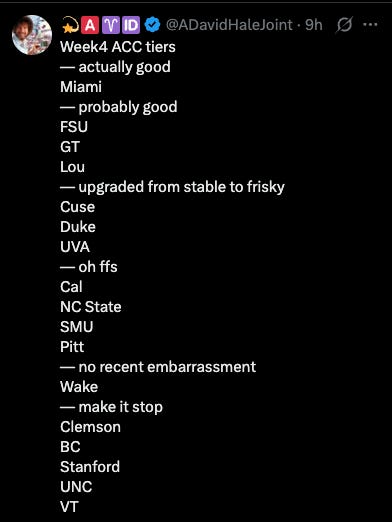Origin Story
The story of who you should blame for all the terrible things I've said and written over the years.
Fun fact: My first job in sports was as a PR intern for a minor league hockey team in San Diego in 2003.
I'd graduated from college two years earlier with a degree in economics, then bounced around monotonous low-level accounting jobs around Philadelphia, and I hated it all. Then, on a whim, I moved to San Diego with a couple friends with the notion that I'd reinvent my life.
Instead, I spent my first six months there doing low-level accounting jobs I hated. But with a beach!
I'd always wanted to be a sports reporter. Well, OK, I wanted to be a baseball player, but that dream was quickly put to bed once I realized I had no athletic ability whatsoever. Then, I thought, maybe sports writer.1
Except being a sports writer didn't seem much less far-fetched than being a baseball player. That was a job reserved for people far more qualified than me. It may seem hard to believe now, in an era in which every human on earth has too much of a public voice and the newspaper business is going about as well as the VHS rental industry, but back in those days, sports writers were essentially gods to me, and the barriers to entry into the business were just shy of asking St Peter for a free pass beyond the pearly gates.
But I came across an ad -- where, I have no recollection -- that the San Diego Gulls, the local ECHL team, were hiring interns. OK, "hiring" may be a stretch. This wasn't a paid position. But I got to go to the games, I got to work at the arena2, and I got to write stuff for their Web site and fan magazine.
The woman who hired me for this job was Tera Black. What she saw in me, I'll never know. Here's a quick image that accurately showcases my basic approach to life at the time.

Nevertheless, Tera let me work there, and it was awesome.
I learned a ton. I got to watch hockey. I got my friends free tickets. The team had tons of deals with local restaurants and bars so I ate roughly 1/3 of my meals for a full year at Souplantation for free, which was a price I could almost afford. After games, the other staff and half the team would end up at a bar called Tomfooleries that was a complete dive but had $4 pitchers of Miller Lite. Life was pretty good.
I actually did well enough at the job that, when the ownership group purchased an arena football team3 the following year, they hired me to the paid position of PR director4 -- largely because Tera recommended me. To be honest, I had no business doing the job and, as it turned out, the job was pretty awful. The team, the league and the management staff were a train wreck. It was an early lesson in just how chaotic sports can be. It's to Tera's credit that I never realized this when working for her. She made the job look easy and the team seem professional. In sports -- especially in minor-league sports -- that's rarely the case.5
By this time, I'd already been thinking about my future. I'd gotten a taste of sports writing, and it served as a reminder that this is what I really wanted out of life. I'd run up a fair amount of credit card debt, and I'd run through my share of Pacific Beach bars, and so I applied for grad school. Tera wrote me a letter of recommendation. Syracuse said I could go there. None of it makes any sense in retrospect.
Anyway, all that's come after feels like a blur, really. I lived in eight different cities in the next 10 years before settling in Charlotte. I worked jobs for next to nothing, covered some amazing moments6, met tons of friends, and despite the utter implosion of the business, I'm somehow still doing the thing I never believed I'd really be able to do.
And yet, most of what I do is complain. I'm not wrong to do it, either. This job is hard. I have younger people ask me often about getting into sports journalism and I always offer the same answer: If you can picture yourself doing something else, you should probably do that. But if you can't imagine being anything other than a sports reporter, you'll find a way to make it work.
I can't imagine what else I'd be doing, so I make it work, too. But making it work isn't just about the effort or the ability or the wherewithal to withstand the onslaught of bullshit that comes with doing the job. It requires help from people who see value in what you do, in who you are — even when (especially when) you don’t.
Funny thing is, about 18 months after I left San Diego, the ECHL team there folded. This was not because it couldn't survive without me, but rather because everything in sports is fleeting. Still, it left Tera and her husband, Jamie, looking for work. They landed in, of all places, Charlotte, where Tera helped run the Checkers (now an AHL team) for the next 20 years. We've crossed paths a couple times since I've been here, but rarely.
Then last week, I was making plans to grab some drinks with a friend who mentioned he was attending a retirement party beforehand. He had a plus-one if I wanted to go, too. Free food. Free booze. At the Coliseum. Oh, and didn't I know the person retiring? Tera Black and her husband Jamie?
So, I tagged along. I got to see Tera. It’s the first time I’d seen Jamie in 21 years. Their oldest daughter, who’d been a toddler when I was in San Diego, just graduated from UNC. They looked about the same. I looked 50 years older.
"Retirement" might be a strong word for what they're doing. They'll probably land back in sports again. But their daughters are home -- one just done college, the other a senior in high school -- and they wanted time with the kids. Time is hard to find when working in sports.
But they'd been such a big part of the success the Checkers have had in Charlotte that the team wanted to send them out properly. There were speeches and videos and stories about old times, and the thing that kept coming up again and again was just how many people Tera had mentored and helped and advocated for -- all people she'd seen potential in when they were just starting out.
I was too naive to truly appreciate that way back when Tera first hired me. I just figured I got lucky, and then I assumed I did the job well because it was fun and I wasn't a complete idiot. There's probably some truth to that, too.
Still, if it wasn't for Tera, I wouldn't be writing this right now. I wouldn't have this job, I wouldn't have met my wife, wouldn't have my kids -- wouldn't have any of the things I truly value in this world.
It's amazing what one person's belief in you can mean in the big picture.
Tera wouldn't suggest she's responsible for all that, I'm sure. There were, after all, tons of other folks who've made their own impact, believed in me when I wasn't at all sure of myself, offered support and optimism and direction when I needed it. But she was the first, and the first domino that falls can lead us to places we never could've imagined.
How lucky I am to have found someone willing to knock down that first domino for me.
Amid all the other bullshit, there are blessings, and the way to survive as those dominos continue to tumble over in directions that are often scary and frustrating, is to stop every so often and remember just how many things had to happen in order for you to be on this ride, and how fortunate we are to have had the right people take the wheel from time to time when we needed it most.
What's David subscribed to?
Last week, one of my favorite TV writers, Alan Sepinwall, was laid off at Rolling Stone. I'd be happy to offer a few thousand words on why that is stupid, but honestly, we've been down this road so very many times before that it hardly feels worth reiterating the larger point -- that journalism is run by businessmen, and those two sides don't often get along. And in a battle between the two, the latter always win.
But Subsstack and there newsletter platforms have offered a home for writers trying to keep their work relevant, which is a good thing. Whether it's a viable business model is another question, but we don't need to get into that here.
Instead, what I figured I'd do is share a few newsletters I think are particularly valuable, and perhaps you'll consider subscribing and providing a little cash to support good work, too.
So...
In the wake of his departure from Rolling Stone, Sepinwall is focusing entirely on his newsletter, which is always a good read.
My good friend Tommy Tomlinson is one of those people who always managed to find something poignant to say -- and often mores when dissecting the small moments in life. And his links always lead me to something good, too.
I don't mean to suggest some both sides-ism here, but I find both political parties distasteful these days. I clearly side with one more than the other when forced to choose, but I've never liked the idea of fitting neatly into any particular group -- let alone when it comes to politics. I've always considered myself a "moral pragmatist." In other words, I believe in whatever creates the most good at the lowest cost that doesn't disproportionately hurt already marginalized people. That's probably not a perfect mission statement, but I evaluate most policy -- and most politics -- by asking if a) it makes sense and b) it can be reasonably described as "the right thing to do." If there's a writer out there whose work best reflects this particular worldview, it's probably Derek Thompson, whose newsletter is fantastic and is always enlightening in ways that make me rethink some previously held notions of both what is logical and what is good.
Steven Hyden is the music critic I have the most in common with, too. He's more of a Dylan guy than I've ever been but beyond that, we have very similar tastes. His latest newsletter is a takedown of trash balladeer Jesse Welles, and it's pitch perfect. (He also offers a recommendation for Brian Dunne's new album "Clams Casino," which I've spent the past few days enjoying.)
Will Leitch came up in the era of bloggers -- he was a Deadspin founder -- and so I think we view writing similarly. Anyway, I really enjoy his newsletter, which is always thoughtful and subtly brilliant.
Paul Kix is a writer and editor (and former ESPNer who I didn't know back when we worked together) and he's usually got some fantastic recommendations -- along with insightful advice on storytelling.
Lastly, if you're not subscribed to Don Van Natta's Sunday Long Read, well you're missing out on the best place to find excellent journalism each week. Before the Pocket app shut down, I was routinely filling it with new stories from this newsletter.
Got any good recommendations of your own? I’d love to hear them.
Oh and speaking of subscribing to things… Be sure you’re subscribed to the Inside ACCess podcast. This week, Andrea and I will be breaking down Florida State’s resurgence, Clemson’s nose dive and we’ll talk with Virginia head coach Tony Elliot.
What's David writing?
Here's this week's Game Day Final which, I'm sad to say, is not my finest work. Moreover, some of the best jokes (IMO) were edited out. That's frustrating. Still, hopefully you'll find a laugh or two.
The topic I tried to focus on for Week 4 was the agony of defeat - from Auburn to Florida to Utah and, yes, Clemson. I think Florida State proved last year we're now in an era where we can probably still make some educated preseason guesses, but what we assume will happen in August can also prove to be completely wrong by the end of September.
I wasn't that high on Clemson coming into this year. I thought the Tigers were a good but not great team. Turns out, they might just be bad.
At Clemson, Dabo Swinney may have wanted to shrug off his team's early struggles as a little bad luck and fluky plays, but after Syracuse dominated the Tigers 34-21 in Death Valley, there were no more illusions. Swinney was emotional, saying he carried the weight of Cle
mson's 1-3 start, noting that he was "not a cyborg." Like famed cyborg The Terminator, Swinney has continued to promise "I'll be back," but this season has had a lot more "Kindergarten Cop" vibes for Clemson. Who could've foreseen a defending ACC champion that entered the season with a veteran QB, a heralded defensive front and a top-five ranking crumbling so quickly and emphatically. Sorry, Mike Norvell. Don't answer that.
Also, if you missed last week's newser from me and Andrea Adelson -- the ACC is meeting today to discuss changes to the conference's schedule. They'll definitely be playing 10 P4 games moving forward, but whether that's 8 or 9 league games remains to be seen. I'm planning to have an update later today, but I don't expect anything to get finalized in Charlotte.
I also had a Twitter thread looking at the various dynamics of playing nine league games that you can find HERE.
What else is David reading?
This was a terrific profile of Syracuse coach Fran Brown from my pal David Ubben -- and it's well timed given the Orange's big win over Clemson on Saturday.
Tyriq Withers was a walk-on at Florida State during the Jimbo Fisher era. Now he's the star of "Him" -- the new movie from Jordan Peele's production company. It's been quite a ride, and this is a cool profile of his path.
Week 4 rankings
As always, my ballot in ESPN’s power rankings…
And my ACC tiers after four weeks…
What's David drinking?
Weller Special Reserve. It's been a long weekend. Happy Monday.
Gary Smith’s profile of Jim Valvano as he battled cancer was the story that made me want to do this for a living.
The San Diego Sports Arena, which was a complete dive of a building. If you’ve ever seen “Almost Famous,” it’s where all the early concert scenes were filmed (I used to enter the building through the tunnel where Penny says “it’s all happening.”) You could literally hear the rats scurrying across the ceiling tiles. It was great.
The San Diego Riptide. Actually arena2 football, which is somehow worse than Arena Football. Mouse Davis was our head coach. He pioneered the “Run N Shoot” offense. When he left messages for people on their voice mail, he’d say “give me a dingle” rather than “call me back.”
This implies I managed people. I did not. I made like $1,600 a month.
Years later, mostly for fun, I did the PA announcing for an Independent league baseball team in Albany, Georgia called the South Georgia Peanuts. They made a documentary about them called “Playing for Peanuts.” The manager was Wally Backman. I have way too many stories about this experience to retell them all now. But it’ll make for a good newsletter one day.
Roy Halladay’s postseason no-hitter, UMBC beating Virginia, and the Wake-Georgia Tech ACC championship game in Jacksonville in 2006. Some were better than others.





